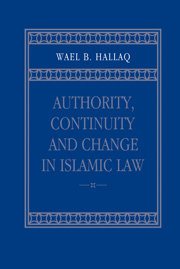Book contents
- Frontmatter
- Contents
- Preface
- 1 Juristic typologies: a framework for enquiry
- 2 Early ijtihād and the later construction of authority
- 3 The rise and augmentation of school authority
- 4 Taqlīd: authority, hermeneutics, and function
- 5 Operative terminology and the dynamics of legal doctrine
- 6 The jurisconsult, the author–jurist, and legal change
- Summary and conclusions
- Bibliography
- Index
2 - Early ijtihād and the later construction of authority
Published online by Cambridge University Press: 27 July 2009
- Frontmatter
- Contents
- Preface
- 1 Juristic typologies: a framework for enquiry
- 2 Early ijtihād and the later construction of authority
- 3 The rise and augmentation of school authority
- 4 Taqlīd: authority, hermeneutics, and function
- 5 Operative terminology and the dynamics of legal doctrine
- 6 The jurisconsult, the author–jurist, and legal change
- Summary and conclusions
- Bibliography
- Index
Summary
The creation of an archetype, i.e., an ideal authoritative model or standard to which all other types must conform or emulate, is undeniably a prime concern of juristic typologies. In the case of Islamic law, this archetype is the absolute mujtahid whose legal knowledge, presumed to be all-encompassing and wholly creative, is causally connected with the founding of a school. The school is not only named after him, but he is purported to have been its originator. The comprehensive and wide-ranging knowledge attributed to the absolute mujtahid is matched only by his assumed in-depth knowledge of, among other things, legal methodology or uṣūl al-fiqh (which is by necessity of his own creation), Quranic exegesis, ḥadīth criticism, the theory of abrogation, legal language, positive and substantive law, arithmetic, and the science of juristic disagreement.
The salient feature of the founders' ijtihādic activity is no doubt the direct confrontation with the revealed texts, for it is only this deified involvement with the divine word that requires and presupposes thorough familiarity with so many important fields of knowledge. Even when certain cases require reasoning on the basis of established legal rules and derivative principles, the founding jurist's hermeneutic is held to be, in the final analysis, thoroughly grounded in the revealed texts. The founder's doctrine constitutes therefore the only purely juristic manifestation of the legal potentiality of revealed language. Without it, in other words, revelation would remain just that, revelation, lacking any articulation in it of the legal element.
- Type
- Chapter
- Information
- Authority, Continuity and Change in Islamic Law , pp. 24 - 56Publisher: Cambridge University PressPrint publication year: 2001



